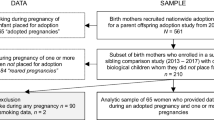Abstract
Objectives: Our objectives were to characterize the stability of pregnancy intention and to examine whether stability is associated with the timing of prenatal care initiation, smoking during pregnancy, and breastfeeding. Methods: We use a sample of women from the National Longitudinal Survey of Youth (NLSY) for whom information on pregnancy intention was collected both during pregnancy and after delivery. In bivariate analyses we compare outcomes and characteristics of women whose pregnancy intention changed between the prenatal and postpartum periods. With multivariate methods, we analyze the correlates of switching pregnancy intention as well as the association between switching and maternal behaviors. Results: Women whose pregnancy intention changes between the two assessments are similar in marital status and socioeconomic background to those who report both during pregnancy and after delivery that the pregnancy is unintended. Disagreement during pregnancy between the parents' pregnancy intentions is the most important predictor of instability in the mother's pregnancy intention. Effects of unintended pregnancy on the timing of initiation of prenatal care, smoking during pregnancy, and breastfeeding based on reports after delivery are smaller than those based on reports during pregnancy, although differences are not statistically significant. Adverse effects of unintended pregnancy are greater when pregnancies reported by the mother to be unintended at either assessment are combined into a single category for unintended pregnancy. Conclusion: Unstable pregnancy intention may be a marker for adverse maternal behaviors related to infant health.
Similar content being viewed by others
REFERENCES
Brown S, Eisenberg L, editors. The best intentions: Unintended pregnancy and the well-being of children and families. Washington, DC: National Academy Press, 1995.
Ryder NB, Westoff CF.Wanted and unwanted fertility in the United States: 1965 and 1970. In: Westoff CF, Parke R Jr, editors. U.S. Commission on Population Growth and the American Future, demographic and social aspects of population growth—Vol. 1. Washington, DC: U.S. Government Printing Office, 1972.
Rosenzweig MR, Wolpin KI. Maternal expectations and ex post realizations. J Hum Resources 1993;28(2):205–27.
Klerman LV, Jekel JF. Unwanted pregnancy. In: Bracken MB, editor. Perinatal epidemiology. New York: Oxford University Press, 1984.
Westoff CF, Ryder NB. The predictive validity of reproductive intentions. Demography 1977;24(3):407–13.
Miller W. Relationship between the intendedness of conception and the wantedness of pregnancy. J Nerv Ment Dis 1974;159:396–406.
Bankole A, Westoff CF. The consistency and validity of reproductive attitudes: Evidence from Morocco. J Biosoc Sci 1998;30(4):438–55.
Joyce T, Kaestner R, Korenman S. Ex post rationalization and the consequences of unintended fertility. Unpublished manuscript, 1999.
Center for Human Resources. NLS handbook 1994. Columbus, OH: Center for Human Resource Research.
Weller RH, Eberstein IW, Bailey M. Pregnancy wantedness and maternal behavior during pregnancy. Demography 1987;24(3):407–13.
Marsiglio W, Mott FL. Does wanting to become pregnant with a first child affect subsequent maternal behaviors and infant birth weight? J Marriage Fam 1988;50:1023–36.
Kost K, Landry D, Darroch J. Predicting maternal behaviors during pregnancy: Does intention status matter? Fam Plann Perspect 1998;30(2):79–88.
Joyce T, Kaestner R, Korenman S. The effect of pregnancy intentions on child development. Demography 2000; 37(1):83–94.
Author information
Authors and Affiliations
Rights and permissions
About this article
Cite this article
Joyce, T., Kaestner, R. & Korenman, S. The Stability of Pregnancy Intentions and Pregnancy-Related Maternal Behaviors. Matern Child Health J 4, 171–178 (2000). https://doi.org/10.1023/A:1009571313297
Issue Date:
DOI: https://doi.org/10.1023/A:1009571313297




